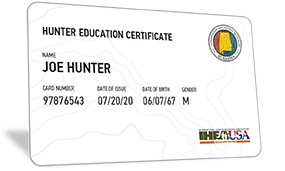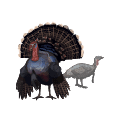
AGE REQUIREMENTS FOR ALABAMA HUNTERS
Every hunter in Alabama who was born on or after August 1st, 1977 is required to complete Hunter Education Certification. Hunters must be at least 10 years of age to get certified.

ALABAMA HUNTING EDUCATION REQUIREMENTS
WHAT IS AN ALABAMA HUNTER EDUCATION CERTIFICATE
An Alabama Hunter Education Certificate proves that you’ve obtained the knowledge needed to hunt safely, responsibly, and ethically, within the state of Alabama. All hunters in Alabama who were born on or after August 1st, 1977 are required to get certified in order to purchase a hunting license.
WHERE CAN I GET MY ALABAMA HUNTER EDUCATION CERTIFICATE?
You can obtain your Alabama Hunter Education Card by completing an Alabama Department of Conservation and Natural Resources-approved (DCNR) course. Courses can be taken either online or in-person, depending on your preference.
Traditional Classroom Course
Traditional classroom-style hunter education courses are free in Alabama and are available to students who are 10 years of age or older. They consist of 8-hour of in-class instruction in addition to a written exam.
Online Course:
Hunters can also obtain their Hunter Education Certificate entirely online if they choose. Online courses typically take about 4-6 hours to complete. Students are issued a Temporary Hunter Education Certificate upon completion. You must be a resident of Alabama who is 10 years of age or older to complete hunter education certification online.
HOW OLD DO I HAVE TO BE TO GET A HUNTER EDUCATION CERTIFICATE IN ALABAMA?
You must be 10 years of age or older to complete a hunter education course in Alabama, and obtain a Hunter Education Certificate.
MENTORED HUNTING PROGRAMS
The state of Alabama offers inexperienced adult hunters with the opportunity to partner with a veteran hunter to learn more about the sport, through the Adult Mentored Hunt (AMH) program. The program aims to increase hunter participation by teaching participants how to hunt, the benefits of hunting and outdoor recreation.
Participants will learn about firearm safety, scouting & hunting, in addition to how to clean their game animal and cook with game meat.
Hunters must register, and be selected, in order to participate in the program. To learn more about Alabama’s AMH program visit the Alabama DCNR website.
Is my Alabama Hunter Education Certificate valid in other states?
The Alabama Hunter Education Certificate will be accepted in any US state, province, or country which also requires mandatory hunter education, meaning hunters who have obtained their Alabama Hunter Education Certificate may use it to hunt in other states. This is known as “reciprocity”.
What's the difference between a Hunter Education Certificate and a Hunting License?
A Hunter Education Card proves that you’ve obtained the knowledge you need to hunt safely and ethically in Alabama, and is different from a Hunting License. The Hunting Licence is similar to a permit and is required to hunt any game animal within the state. Different licenses and permits may be required depending on which game animal is being hunted.

HUNTING LICENSES, STAMPS, AND PERMITS
HUNTING LICENSES
A Hunting License is required in the state of Alabama to hunt any game animal. There are a variety of license types available depending on your age, residency status, and what type of game you plan to hunt. Some of the hunting license types in Alabama include:
Resident Annual Hunting License
Issued to residents of Alabama who are aged 17-64. This license type is available for either all-game types, or small game only, depending on the license type purchased. The license is valid from the 1st of September through to August 31st, of the following year.
Resident 64 Lifetime License
Alabama residents who are 64 years of age or older may obtain a Resident 64 Lifetime License. All residents within the state are issued this license type at 64 years of age, as long as they possess an Alabama Driver’s License. This license exempts the hunter from being required to obtain future annual hunting licenses, however certain license privileges may still be required including bathing and duck stamp requirements.
Hunter Exempt License Privilege (H.E.L.P)
The State of Alabama provides hunters with the option of obtaining a Hunter Exempt License Privilege or “H.E.L.P” license. This license type is available to hunters who are exempt from purchasing a hunting license, including:
- Hunters who are 15 years of age or less (residents and non-residents)
- Alabama residents who are 65 years of age or older who possess an AL driver’s license
- Alabama residents who hunt on their own property, and possess an AL driver’s license
The license provides eligible hunters with a unique identifying number which is used to enter deer and turkey harvest information into Alabama’s Game Check Database system.
Hunters who are eligible for the H.E.L.P license should keep in mind that while they may be exempt from certain license privileges they may still be required to obtain various licenses to participate in certain types of hunter (ex. Baiting, or federal duck stamp requirements). For more information on the HE.L.P license, and how to obtain one visit the Alabama DCNR website.
Baiting Privilege License
Hunters must obtain a baiting privilege license to legally bait white-tailed deer and feral swine within the state of Alabama. Baiting privileges cost $15 and, once purchased, allow Alabama residents to bait white-tailed deer and feral swine on private land, or leased land. Boating is prohibited in public hunting areas, including Wildlife Management Areas.
ALABAMA HUNTER CERTIFICATION AGE REQUIREMENTS

UNDER 16 YEARS OF AGE
Hunters who are less than 16 years of age are not required to purchase a hunting license to hunt deer within the state.
Hunters who are less than 16 years of age may hunt within the state of Alabama without supervision as long as they have obtained Hunter Education Certification. If the youth has not obtained a Hunter Education Certificate they must be supervised by a certified and licensed adult who is 21 years of age or older. The supervisor must remain within 30 feet of the hunter being supervised and within normal voice control.

16 Years of age or older
Hunters who are 16 years of age or older must obtain a license to hunt deer within the state, in addition to a Hunter Education Certificate. Hunters who have not completed hunter education certification may hunt as long as they are under the direct supervision of a certified and licensed adult who is 21 years of age or older. The supervisor must be within 30 feet of the hunter being supervised and within normal voice control.

Born on or after August 1st, 1977
Hunters who fall into this age group are required to complete a state-approved Hunter Education Course in order to purchase a hunting license, or legally hunt game within the state.

Alabama's Hunting Fines

Obtaining a hunting license without proof of hunter education
Up to $500

Hunting without a License
Up to $100

Hunting at night
Up to $100

Hunting or possession of game during the closed season
Up to $2,000

Failure to wear hunter orange
Up to $50
ALABAMA HUNTING FAQS
DO I NEED A HUNTING LICENSE TO HUNT WITHIN THE STATE OF ALABAMA?
Yes. A Hunting License is different from a Hunter Education Certificate and is required for any person who hunts any game animal within the state. This includes both residents and non-residents. Varying licenses must be purchased and carried depending on the hunter’s age, residency, and the type of game being hunted. Certain exceptions may apply depending on the game animal being hunted. For more information on Alabama, hunting licenses visit the Alabama DCNR website.
WHAT ARE THE ALABAMA TAGGING REQUIREMENTS?
Certain game animals must be reported or “checked” after they’re taken, including big game animals such as deer, and turkey. It’s important for hunters to understand the harvest reporting requirements for the game animal they’re hunting, and to ensure that the animal is reported properly.
Alabama Game Check System and Harvest Reporting
In Alabama, deer and turkey hunters are required to report their harvest within 48 hours. This can be completed either by completing a paper harvest report or by using the Outdoor Alabama App, and then reporting the harvest through Alabama’s Game Check system.
The Outdoor Alabama app can be used to record harvests, even in areas which don’t have cell phone service. Once the hunter returns to a service area the app will automatically complete the report and provide the hunter with a confirmation number.
Deer and turkey harvest may also be reported by phone by calling an Alabama SCNR District office.
WHAT ARE THE HUNTER ORANGE REQUIREMENTS IN ALABAMA?
In Alabama, hunters are required to wear a minimum of 144 square inches of hunter orange on an outer garment worn above the waist, or a full sized hunter orange hat or cap. The hat may include a small logo but otherwise must be solid hunter orange. These requirements apply to all hunters who are hunting any species during the gun deer season, youth and muzzleloader deer seasons, with the exception of foxes, raccoons, and oppossums during legal night-time hunting hours, or those hunting turkey, crows, or migratory birds.
Hunter Orange Exceptions
Hunter orange requirements do not apply when:
- Hunting from a stand that is 12 feet or more from the ground
- Hunting within an enclosed box stand
- Traveling in an enclosed vehicle
- Traveling on foot directly for no more than 20 feet from operating an enclosed vehicle to a stand where the hunter is exempt from wearing hunter orange
WHAT ARE THE BAG LIMITS IN ALABAMA?
Bag limits are imposed on hunters to restrict the number of a particular game animal that can be taken. Bag limits may be daily or seasonal depending on the type of animal. For example, daily bag limits may be imposed which restrict the number of a particular game animal which can be taken per-day, while seasonal bag limits restrict the number of a particular game animal that may be taken by a hunter within the hunting season.
Bag limits per species are managed carefully and may vary annually depending on game species populations, and other factors. Hunters must understand and follow bag limit restrictions. Violations may result in fines. For more information on bag limits visit the Alabama DCNR website.

GAME AND NON-GAME SPECIES
GAME SPECIES
Alabama offers a wide variety of game species for all types of hunters. The natural diversity of Alabama’s landscape results in numerous game species and hunting opportunities.
Game species in Alabama include:
- Big game including white-tailed deer and turkey.
- Small game including dove, quail, rabbit, squirrels, and oppossums.
- Waterfowl and other migratory game birds including ducks, geese, and coots.
- Furbearers including beaver, bobcat, fox, mink and muskrat.
NON-GAME SPECIES
Nongame species within the state makeup 95% of the state’s native species and include mammals, birds, fish, reptiles, amphibians, and invertebrates which may not be legally hunted, are considered a nuisance or are protected, endangered, or at risk. There is, unfortunately, a lengthy list of endangered, protected, and threatened species within the state. For more information on nongame, and endangered species within the state visit the Alabama DCNR non-game wildlife program page.
INVASIVE SPECIES
Invasive animals and other pests have been introduced to the United States, including the State of Alabama, and have become a threat to native wildlife. These animals, plants, fish, and invertebrates typically have no natural predators which can result in the rapid spread and population growth. This in turn can seriously harm the state’s lands and waters and can be detrimental to the health and population numbers of a variety of the state’s native plants and animals.
In order to protect Alabama’s native plants and animals, invasive species must be controlled and eradicated. Anyone who encounters or suspects that they have encountered an invasive species within the state is encouraged to report the sighting so that it can be monitored and controlled. For information on how to report various types of invasive species in Alabama visit the Alabama DCNR Nuisance Animal Control page.

ALABAMA HUNTING SEASONS
Hunting seasons and dates may change annually per game animal, depending on a variety of factors. Season dates are further broken out by region or “zone” and are often categorized by firearm type, including archery, firearms, and muzzleloader or “primitive” firearms seasons.

Deer
Deer seasons in Alabama are organized by firearm type, hunting tactic (ex. Stalking vs. dogs), zone, and firearm type. Deer hunting season typically begins in October and November, depending on the zone and method, with later seasons ending in January of the following calendar year.

Turkey
Turkey seasons in Alabama are organized by various regions or “zones” within the state, and include both spring and fall seasons. Seasons dates may also vary depending on the age of the hunter (ex. Youth season). Spring turkey season typically begins in March and ends in May while the fall season takes place in November and December.

Dove
Dove seasons in Alabama include dates for mourning doves and white-winged dove. Dates vary depending on the hunting zone, and shooting hours may vary depending on the season. Dove seasons typically begin in September, with later seasons ending in January of the following calendar year.

Waterfowl
Waterfowl season dates in Alabama vary depending on the species (ex. Ducks and geese). Waterfowl seasons typically take place in the fall and winter months, with earlier seasons beginning in September and October while later seasons take place in December and January.
HUNTING ON PUBLIC OR PRIVATE LAND
PRIVATE LAND
Much of the land in Alabama is privately owned. Hunters can typically freely take game animals hunted on their own private property or may seek permission from a landowner to hunt on private property. Hunters who wish to take game on privately owned land must follow state hunting regulations as well as any regulations specified by the landowner. Hunters must ensure they respect the rights and property of the landowner at all times.
SPECIAL OPPORTUNITY AREAS
Special Opportunity Areas (SOAs) are properties which are typically smaller than Wildlife Management Areas and are often used for drawn hunts, and smaller takes/bag limits
Annually, certain counties within the state offer a limited number of slots for successful permit holders, which allow them to hunt within a particular SOA for a designated number of days.
Hunters who are granted access to hunt within these areas should keep in mind that regulations may vary from typical hunting rules within the state including bag limits, hunting hours, take methods and game species that may be hunted.
For more information on hunting within SOAs visit the Alabama DCNR Special Opportunity Area webpage.
PUBLIC LAND
There are numerous hunting opportunities on public lands in Alabama. In fact, there are more than 700,000 acres of public hunting space within various state-managed lands including Wildlife Management Areas, Special Opportunity Areas, State Parks, and Forests. These lands are open to a variety of outdoor recreational activities including hunting, hiking, and bird watching, among others.
Public lands within the state also encompass varied habitats, landscapes, and game species providing opportunities for hunters of all skill levels and interests. Alabama’s Forever Wild Land Trust also provides hunting opportunities on some lands. Some of these lands have been incorporated into existing Wildlife Management Areas, while stand-alone land trust properties are designated as natural preserves or recreation areas.
For more information on public lands that are open to hunting within the state, visit Alabama’s DCNR Public Hunting page.
Wildlife Management Areas
Hunting in Alabama’s Wildlife Management Areas (WMAs)
Alabama’s Wildlife Management Areas are managed by the Alabama DCNR Division of Wildlife and Fisheries. These areas encompass more than 700,000 acres of land throughout the state and offer multiple opportunities for outdoor recreational activities, including hunting.
Wildlife Management Areas (WMAs) within the state vary in size, with some smaller in size at around 400 acres while others span a massive 90,000 + acres of space. Game species within many WMAs are numerous and varied providing plenty of opportunities for hunters to take advantage of Alabama’s diverse wildlife and wild game species.
WMA Regulations
Hunters should keep in mind that regulations within WMAs may differ from other public hunting spaces, or regulations that apply on private lands. Some of these regulations include:
- Restrictions on the use of dogs to hunt deer or turkey
- Deer hunting tactics restrictions (ex. Stalking with multiple hunters during certain hours)
- Take method restrictions (ex. Minimum gauge requirements when hunting turkey with a shotgun)
- Restrictions on other types of recreational use such as fireworks use and camping.
WMA Permits
Hunters are not required to obtain a permit to access or hunt within Wildlife Management Areas however, they must ensure that they possess the required game permits and habitat stamps to take game within the state.
The Yellowhammer State. Ready and rarin’ to go.

Where to Hunt in Alabama
There are plenty of game animals for hunting in Alabama, in addition to millions of acres on which to hunt them. Deer, turkey, and squirrel hunters will find no shortage of hunting opportunities – the only questions if, where are the best places to find them?
Deer hunters should focus their efforts in the west-central part of the state, or in the northern region where deer take numbers are consistently high. Public hunting spaces in these regions include the Mulberry Fork WMA and Sam R. Murphy WMA.
There’s also plenty of turkey hunting in this southern state, and turkey populations are well managed within the state’s WMA’s. Top public hunting spaces for turkey include Choccolocco WMA, and Wolf Creek – among several others.
While many might believe that you can hunt squirrels anywhere – Alabama is a top state for hunting these furry critters,who can present a real challenge to hunters who underestimate their speed and ability to elude predators. But believe it or not, there are actually prime locations where you’ll have better luck. Looks for wooded areas with lots of hardwood trees for the best odds. Wolf Creek WMA is considered to be a top spot for Squirrel Hunters in Alabama.